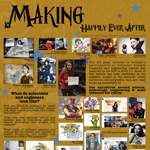Collaborators: Gillian Hayes (UCI), Rebecca Black (UCI)
(Taken from the project summary of our recent NSF proposal)
We have submitted a proposal to the NSF to explore the use of “transformative play” as a technique for engaging underserved populations in informal STEM learning. There is an urgent need to increase the presence of underrepresented minorities (URM) in technical fields. The NSF’s 2013 report on URMs in science and engineering reports that women’s participation in computer science and engineering has dropped over the last 20 years. Evidence suggests that much of this decline can be tied to the negative impact of the sciences’ social narratives around gender, race, and class on young students. To overcome these narratives, students must be engaged with science learning not just at the level of skill acquisition, but also identity construction.
The intervention at the heart of this work is a series of after-school workshops for middle-school aged girls within the predominately Latino communities in Southern California. These workshops will employ strategies and practices from the Making and Do-It-Yourself communities to bridge the gap between playful and recreational crafting and more vocationally-oriented skill development. We will employ techniques from theater practice that support the “outside-in” creation of new identities for students to inhabit. These techniques use external scaffoldings such as masks, costumes, scripts, and game rules to provide a participatory structure for enacting new roles.
This proposal will advance research in education, design, games science, and computing. It will also advance educational practice, especially in relation to informal learning environments, including after school programs, summer camps, and other workshop venues. A nontraditional approach to engineering pedagogy can invigorate educational efforts by allowing students to engage through exploration. We are particularly interested in understanding how hands-on engagement with materials through the narrative of fantasy promotes both STEM learning and identity transformation for girls in considering careers in STEM. Students learn well in teams while engaging in hands-on activities, and we can view these practices through the lens of transformative play. Furthermore, when students understand their own role in and potential to combat the problems they see in their communities, they can be particularly motivated to learn STEM concepts. This proposal is innovative in combining these elements into a comprehensive workshop-based approach to informal STEM education, which has the potential to transform educational and outreach efforts. This project also has important social and ethical implications. Interest in computing and technology has diminished in recent years, particularly for minority groups and women, even as enrollments in other areas of the sciences and mathematics have stayed flat or increased. Furthermore, Spanish speakers and other URM groups relevant to this proposal continue to grow. Thus, the project’s progress on social and ethical issues will contribute substantially to progress in STEM-related disciplines and improve URM groups’ involvement in STEM.
The proposed benefits of this work to society are considerable. In the short term, we will serve an often-neglected population in STEM research, middle school Latinas. By engaging these students in workshops, we will provide the extra instruction and attention this community might need to get involved in STEM academics and careers. The long-term benefits to society include the broader interest and participation of women, Latinos, and other minorities in computing as the workshop participants are impacted both locally, in Southern California, and nationwide, through our partners. Our approach also will generate a model for engaged scholarship and service-learning in engineering and computing, areas that traditionally do not focus on these aspects. This research agenda takes an important step in orienting the curriculum at UCI toward “Socially Relevant Computing”, mirroring trends toward engaged research in computing. Research indicates that women are more likely to engage in “computing with a purpose”. Thus this research agenda will encourage recruitment of more women to the school, currently a major challenge for computing in general. Additionally, we will explicitly recruit Latina college students and other underrepresented minorities to work on this research and provide mentorship to workshop students, recognizing that mentorship is often most powerful when it comes from people seen to be “like” the mentees.
